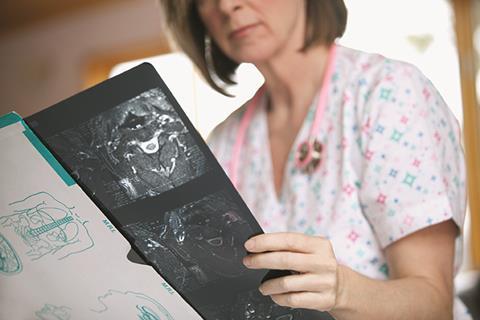Specialist nurses are far from just the ‘icing on the cake’ – in inflammatory bowel disease alone they are consistently preventing emergency attendances and ensuring the most appropriate use of services. Report by Claire Read

When Bu Hayee first reviewed the 2013 hospital episodes statistics (HES) data on accident and emergency attendances for ulcerative colitis, he was convinced there was some kind of mistake.
Where nurses are running effective advice lines, patients with complex Crohn’s or complex ulcerative colitis – or a flare of a straightforward condition – don’t pitch up at A&E
After an initial four months in which hardly any patients with the condition arrived at his hospital’s emergency department, things abruptly changed.
“Suddenly in May to June we had this huge spike where we saw almost an attendance a day: between 20 and 30 attendances per month for those two months,” recalls Dr Hayee, clinical lead for gastroenterology at King’s College Hospital Foundation Trust.
“Initially I thought it was a bit odd, and that it was just a data error. But we looked back and went through the data manually, and actually it was true. And we realised May and June was when our single handed inflammatory bowel disease (IBD) nurse went on maternity leave, and we couldn’t cover her for those two months.”
Sure enough, when an IBD specialist nurse was reintroduced, A&E attendances for patients with ulcerative colitis fell. It is a small but striking example of the impact these nurses can have on the efficiency of care. The exact roles performed by such staff may vary, but Isobel Mason says a telephone advice line is a constant – and thus so is avoidance of unplanned care.
“Where nurses are running effective advice lines, patients with complex Crohn’s or complex ulcerative colitis – or a flare of a straightforward condition – don’t pitch up at A&E,” argues Ms Mason, nurse consultant at Royal Free London FT and IBD nursing development manager at Crohn’s and Colitis UK.
“They call the nurse and the nurse manages them appropriately. Sometimes that’s without the patient even needing to attend the hospital, or by [the nurse] putting them into the right acute management pathway, so avoiding A&E. That’s a massive cost saving, and something that everyone wants. Nobody wants general A&E doctors having to deal with the complexities of IBD management.”
Smart thinking
It is a strong argument, but Vikki Garrick – paediatric IBD nurse specialist and GI nurse team lead at the Royal Hospital for Children, Glasgow – fears she and her colleagues are still seen as “the icing on the cake”, there solely to deliver outstanding patient care. For A&E avoidance and much else besides, she contends IBD nurse specialists should in fact be considered less as icing and more as “a fundamental part of the batter”.
If you can get expert nurses to assess patients and either keep them at home or move them along quicker, it frees up the front door for those emergencies that need support from other areas
“The clinical nurse specialist is not all about the delivery of patient care,” she emphasises. “It’s about designing a service that will support the patient: doing the best you can for your patients with the resources that you’ve got, and thinking smartly about how you do that.”
There are now more than 300,000 people in the UK living with either ulcerative colitis or Crohn’s disease – the two main types of IBD – and numbers are increasing. Around 25 per cent of those cases will be diagnosed in childhood or adolescence.
While the exact symptoms vary, these conditions are always chronic and involve periodic exacerbations. Such flare-ups can include severe abdominal pain and frequent passing of watery stools, sometimes with blood.
These are disturbing and unpleasant symptoms, but rarely best managed in an emergency setting. The problem is that a third of patients report no access to an expert IBD nurse, and 63 per cent of services do not have enough nurses to meet national standards. That means A&E or the GP becomes the point of call.
As a healthcare manager, a Crohn’s patient, and a trustee of Crohn’s and Colitis UK, it is a state of affairs into which Amanda Quincey has a particularly keen insight. She recognises that, for a commissioner or for a provider chief executive with multiple priorities, it can be difficult to decide to spend money on an IBD specialist nurse rather than on something else which may have a higher profile.

“But there’s evidence starting to come through that shows you do prevent admissions by having that swift access to advice, support and clinical expertise,” she points out. “And as someone who’s managed services, your front door is critical – you have to keep that flow moving through the hospital.
“So if you can get expert nurses to assess patients and either keep them at home or move them along quicker, it frees up the front door for those emergencies that need support from other areas.”
Benefits of investment
Primary care also benefits, she suggests. “The average GP has perhaps 1,500 patients on their list, will only have seven patients on their system who has IBD, and will only see a new Crohn’s diagnosis every seven years. That’s where specialists within nursing really can pay dividends.”
David Barker, the charity’s chief executive, admits it’s obvious for a patient organisation to support a staff group so often associated with excellent care
At Crohn’s and Colitis UK, the belief in the value of these nurses is such that campaigning for more is at the heart of the charity’s strategy. The More IBD Nurses – Better Care campaign aims to get to a point where 95 per cent of the organisation’s supporters have access to a named and appropriately trained IBD nurse.
David Barker, the charity’s chief executive, admits it’s obvious for a patient organisation to support a staff group so often associated with excellent care. But he wants holders of purse strings to understand the benefits of investing in specialist nursing go beyond high quality care.
“There is no money in the NHS – we all know that, and all know it’s about how do we get more for the same, or in some cases more for less. Service redesign is critical to that, and where we’re seeing real successes IBD specialist nurses have sat at the heart of that.”
He continues: “There are just so many benefits on so many levels to having good specialist IBD nurse provision. If you look at the power of a nurse in supporting patients, saving money, avoiding admittance to hospital, avoiding inappropriate outpatient appointments, avoiding A&E, there is a very, very powerful case to be made for the difference they can make.”
Isobel Mason on why you should care about IBD specialist nurses

If you are a hospital chief executive, you may recently have received an email about the care your trust offers for inflammatory bowel disease.
Maybe you’ve received messages from several patients. Since May 2016, over 6,000 emails from 1,200 people have been sent to trust heads up and down the country.
Chances are you don’t often receive letters about IBD. We know that it’s probably not a condition which is typically high on the list of those commanding your attention.
Yet the illnesses covered by that generic term – most notably Crohn’s disease and ulcerative colitis – are on the increase. More than 300,000 people in the UK now have an IBD diagnosis.
These are long term conditions, unpredictable in their course. And, significantly, if those with IBD don’t get the right care then they are likely to be users of unscheduled care at your hospital.
That means A&E attendances and emergency admissions, putting pressure on your already stretched services and finances. It is estimated that care of IBD patients costs the NHS £470m a year, with lifetime medical costs comparable to those for diabetes and cancer.
At Crohn’s and Colitis UK, we know specialist nurses are key to reducing these costs and avoiding these outcomes. So do our supporters: the ones who have been emailing you in recent months.
With an IBD specialist nurse in place, those with the condition have a point of continuity – a clinical expert who can offer close monitoring, timely advice and support, and brokering of care across sectors. That keeps patients out of hospital.
For you as a senior leader, the result is cost savings. Consider that specialist nurses are also ideally equipped to lead service redesign and there are more efficiency savings still.
This special report explores the value offered by IBD specialist nurses – something we are also emphasising through our More IBD Nurses – Better Care campaign.
We hope these articles will convince you such posts represent an investment in greater efficiencies and excellent patient care.
If they do, and you would like help with local service development and business planning, please get in touch. We are ready to help – and thousands of patients are willing you to put this on your agenda.
Isobel Mason, nurse consultant at Royal Free London Foundation Trust and IBD nursing development manager at Crohn’s and Colitis UK
A powerful case for specialist nurses

Specialist nurses are far from just the ‘icing on the cake’ – in inflammatory bowel disease alone they are consistently preventing emergency attendances and ensuring the most appropriate use of services
 Currently
reading
Currently
reading
A powerful case for specialist nurses
- 2
- 3
- 4


































3 Readers' comments